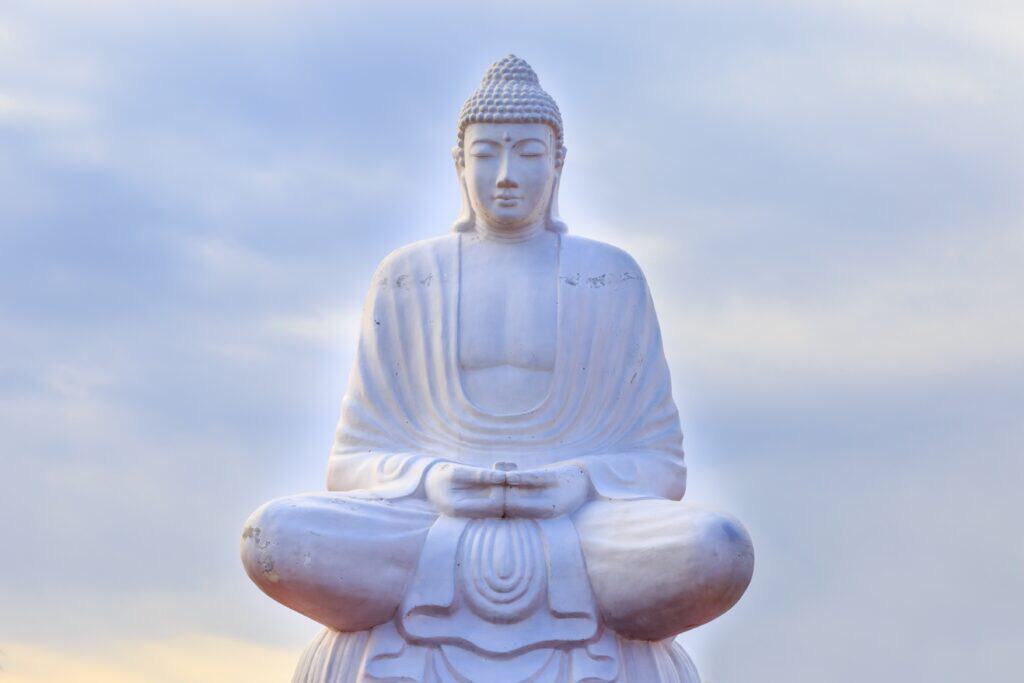Sunyata is a central concept in Buddhism, particularly in Mahayana Buddhism. It is often translated as “emptiness,” but its meaning goes beyond that. Sunyata refers to the idea that all phenomena, including ourselves, are empty of inherent existence or self-nature. This means that everything is interdependent and interconnected, and there is no permanent or separate self.
In Buddhism, the concept of sunyata is closely related to the idea of impermanence and non-self. It is a way of understanding the nature of reality and the human experience. By recognizing the emptiness of all phenomena, Buddhists aim to overcome attachment and aversion, which are seen as the root causes of suffering. Instead, they strive for wisdom, compassion, and liberation from the cycle of birth and death.
Foundations of Sunyata in Buddhism
Historical Introduction
Sunyata is a fundamental concept in Buddhism that refers to the emptiness, voidness, or ultimate reality of all things. The concept of sunyata emerged in the early Buddhist texts, where it was used to explain the nature of existence and the impermanence of all things. The concept was later developed by Nagarjuna, a Buddhist philosopher who lived in India in the second century CE. Nagarjuna is considered the founder of the Madhyamaka School of Buddhist philosophy, which is also known as the Middle Way.
Philosophy of Sunyata
The philosophy of sunyata is based on the idea that all things are empty of inherent existence. According to the Buddhist view, all things are dependent on other things for their existence, and there is no fixed or permanent self or essence to anything. This concept is closely related to the Buddhist concept of anatta, which refers to the absence of a permanent self or soul.
The Madhyamaka School of Buddhist philosophy developed the idea of sunyata further, arguing that even the concept of emptiness itself is empty. This means that there is no fixed or permanent reality to anything, including the concept of emptiness. This view is often referred to as the doctrine of emptiness.
Dependent Origination
The concept of sunyata is closely related to the Buddhist concept of dependent origination. According to this concept, all things arise in dependence on other things. This means that nothing exists independently or in isolation. All things are interconnected and interdependent, and their existence is conditioned by other things.
The concept of dependent origination is central to both Theravada and Mahayana Buddhism. In Theravada Buddhism, it is seen as a way to understand the nature of suffering and the cycle of rebirth. In Mahayana Buddhism, it is seen as a way to understand the nature of reality and the ultimate goal of enlightenment.
In conclusion, the concept of sunyata is a fundamental concept in Buddhism that refers to the emptiness or ultimate reality of all things. It is closely related to the Buddhist concept of anatta and the philosophy of dependent origination. The Madhyamaka School of Buddhist philosophy developed the concept further, arguing that even the concept of emptiness itself is empty.
Understanding Sunyata
Sunyata, also known as emptiness, is a central concept in Buddhism that refers to the ultimate nature of reality. It is the realization that all phenomena lack inherent existence and are interdependent.
Essence of Sunyata
The essence of Sunyata is that all phenomena are empty of a self-nature or essence. This means that everything is in a constant state of flux and change, and there is nothing permanent or unchanging.
No Self
The concept of no self, or anatman, is closely related to Sunyata. It is the understanding that there is no permanent, unchanging self or soul, but rather a constantly changing collection of aggregates or skandhas.
Ultimate Nature
The ultimate nature of reality is emptiness. This means that all phenomena lack inherent existence and are interdependent. This understanding allows us to see the world as it really is, free from the distortions of our own perceptions.
Two Truths
Buddhism teaches that there are two truths: conventional truth and ultimate truth. Conventional truth refers to the relative reality that we experience in our daily lives, while ultimate truth refers to the ultimate nature of reality, which is emptiness.
In summary, Sunyata is the realization that all phenomena lack inherent existence and are interdependent. It is closely related to the concepts of dependent arising, no self, and the ultimate nature of reality. Understanding Sunyata allows us to see the world as it really is, free from the distortions of our own perceptions.
Sunyata in Mahayana Buddhism
Sunyata, also known as emptiness, is a central concept in Mahayana Buddhism. It refers to the ultimate nature of all things, which is devoid of inherent existence. In other words, everything is empty of any permanent, independent, or self-existent reality. Sunyata is not a nihilistic or pessimistic view, but rather a liberating insight that helps practitioners to overcome suffering and attain enlightenment.
Heart Sutra
One of the most famous texts in Mahayana Buddhism is the Heart Sutra, which is a concise expression of the Prajnaparamita or Perfection of Wisdom. The Heart Sutra teaches the emptiness of all phenomena, including the five aggregates or skandhas that constitute a person. It states that form is emptiness, emptiness is form, and so on for the other skandhas. The Heart Sutra also emphasizes the importance of wisdom and compassion in realizing sunyata.
Buddha-Nature
Another important concept in Mahayana Buddhism is Buddha-nature, which refers to the inherent potential for enlightenment that exists within all beings. Buddha-nature is not a soul or a permanent essence, but rather a dynamic and evolving process of transformation. It is said to be obscured by ignorance and defilements, but can be realized through the practice of wisdom and compassion.
Tathagatagarbha
Tathagatagarbha is another term used in Mahayana Buddhism to describe the ultimate nature of all things. It literally means the womb or embryo of the Tathagata or Buddha. Tathagatagarbha is often associated with the idea of Buddha-nature but emphasizes the positive qualities and potentials rather than the negative aspects of emptiness. It suggests that all beings have the potential to become Buddhas and that emptiness is not a void or a negation, but a source of infinite possibilities.
In summary, sunyata is a fundamental concept in Mahayana Buddhism that emphasizes the emptiness of all phenomena. It is not a nihilistic or pessimistic view, but a liberating insight that helps practitioners to overcome suffering and attain enlightenment. The Heart Sutra, Buddha-nature, and Tathagatagarbha are some of the key teachings associated with sunyata in Mahayana Buddhism. Wisdom, compassion, enlightenment, liberty, and the skandhas are all relevant entities that are interconnected with the concept of sunyata.
Sunyata in Meditation and Ethics
Meditation
In Buddhism, meditation is a key practice that helps individuals to cultivate mindfulness, concentration, and insight. Sunyata is an important concept in Buddhist meditation, particularly in Mahayana Buddhism. As a form of meditation, Sunyata is developed by perceiving the six sense-spheres and their objects as empty of any self, leading to a formless jhana of nothingness and a state of equanimity. By meditating on Sunyata, individuals can develop a deeper understanding of the nature of reality and overcome their attachment to the self.
Ethics
Sunyata is also relevant to Buddhist ethics. The concept of Sunyata suggests that everything is interconnected and that nothing possesses an essential, enduring identity. This means that individuals should strive to act with compassion and avoid causing harm to others, as all beings are interconnected and interdependent. In Buddhist ethics, the cultivation of virtues such as generosity, kindness, and wisdom is seen as important for developing a sense of interconnectedness and promoting the well-being of all beings.
The concept of Sunyata also relates to the Buddhist teaching of Anātman, which suggests that there is no permanent, unchanging self or soul. This means that individuals should avoid clinging to a fixed sense of identity and instead cultivate a sense of openness and flexibility. By recognizing the impermanence and interdependence of all things, individuals can develop a greater sense of compassion and avoid causing harm to others.
Criticism and Revision of Sunyata
Sunyata, the concept of emptiness, has been subject to criticism and revision in the Buddhist tradition. These criticisms and revisions have been aimed at refining and clarifying the concept and its implications.
Nihilism
One of the main criticisms of Sunyata is that it can be interpreted as a form of nihilism, which denies the existence of all things. This is not the case, as Sunyata does not deny the existence of phenomena, but rather their inherent existence. Sunyata is not a denial of reality, but rather a denial of the substantiality of things.
Substance
Another criticism of Sunyata is that it denies the existence of substance, which is seen as a fundamental aspect of reality. However, Sunyata does not deny the existence of substance, but rather the existence of an independent, permanent substance. Sunyata asserts that all phenomena are dependent on other phenomena for their existence, and that they are impermanent and constantly changing.
Delusion
Sunyata has also been criticized for being a form of delusion, as it denies the existence of a permanent self or identity. However, Sunyata does not deny the existence of identity, but rather the existence of a fixed, permanent identity. Sunyata asserts that identity is a product of causes and conditions, and that it is impermanent and constantly changing.
In recent years, Sunyata has been subject to revision and reinterpretation in light of new developments in science and technology. For example, some scholars have argued that Sunyata can be understood as a form of quantum theory, which asserts that reality is characterized by uncertainty and indeterminacy. Others have argued that Sunyata can be understood as a form of postmodernism, which denies the existence of fixed, objective truths and asserts the importance of multiple perspectives and interpretations.
In conclusion, Sunyata is a complex and multifaceted concept that has been subject to criticism and revision in the Buddhist tradition. While some criticisms are based on misunderstandings of the concept, others have led to important refinements and clarifications. As Sunyata continues to be reinterpreted and revised in light of new developments in science, technology, and philosophy, it will continue to be a vital and dynamic aspect of Buddhist thought.
Conclusion
In conclusion, Sunyata is a fundamental concept in Buddhist thought that emphasizes the emptiness of all phenomena. This emptiness is not a negation of existence but rather the undifferentiation out of which all apparent entities, distinctions, and dualities arise.
The Yogācāra school of Buddhism posits that consciousnesses and the objects of consciousness arise together and are mutually dependent, which reinforces the idea of dependent nature. The Madhyamika school, on the other hand, emphasizes the emptiness of all phenomena and the lack of inherent existence.
Sunyata challenges the Indian tradition’s notion of Ātman, which posits the existence of a permanent, unchanging self. Instead, Sunyata emphasizes the impermanence and interdependence of all phenomena.
Dreams and illusions are often used in Buddhist literature to illustrate the concept of Sunyata. They are seen as examples of how our perceptions can be deceptive and how we can become attached to things that are ultimately empty.
The idea of independence is also challenged by Sunyata, as it emphasizes the interdependence of all phenomena. Viveka, or detachment, is seen as a way to overcome attachment and to see things as they really are.
Finally, the Tathagatagarbha literature, which speaks of the Buddha nature or the potential for enlightenment within all beings, is seen as a way to reconcile the seemingly paradoxical notions of emptiness and fullness.
Overall, Sunyata is a complex and nuanced concept that challenges many of our assumptions about the nature of reality. By emphasizing the interdependence and emptiness of all phenomena, it encourages us to let go of our attachments and to see things as they really are.













